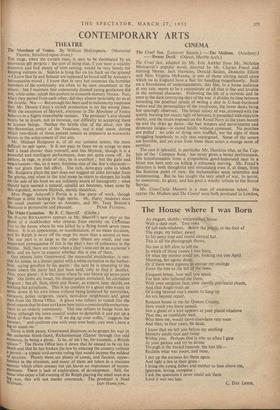CONTEMPORARY ARTS
THEATRE
THE stage, when the curtain rises, is seen to be dominated by an enormous gilt pergola : the sort of thing that, if you were a wealthy eccentric and had plenty of wire netting, would be very handy for keeping vultures in. Salerio is lying flat on his back on the ground
—1 know that he and Solanio are supposed to bored stiff by Antonio's introspective mood ; I know that in very hot countries the humbler members of the community are often to be seen recumbent in the streets ; but I maintain that expensively dressed, young gentlemen did not, while sober, adopt this posture in sixteenth-century Venice. Nor, When they parted from each other, did they almost invariably do so at the double. Nor— But enough has been said to indicate my suspicion that Mr. Dennis Carey's stylish production is on the wrong lines. With the exception of Shylock, everyone in The Merchant of Venice behaves in a highly improbable manner. The producer's aim should surely be to lessen, not to increase, our difficulty in accepting them as human beings. Neither the brittle chic of the decor, nor the neo-Bensonian antics of the Venetians, nor a trial scene during which two-thirds of those present remain as impassive as waxworks assists in the achievement of this aim.
Mr. Michael Redgrave is, of all our eminent actors, the most difficult to spit upon. It is not easy to fawn on or cringe to men half a head shorter than yourself, and this Shylock, though it is a powerful and intelligent performance, does not quite come off. In pathos, in rage, in pride of race, he is excellent • but the guile and opportunism—the, as it were, feminine side of the Jew's character— are not given their full effect. The rich, dove-grey robe in which Mr. Redgrave plays the part does not suggest an alien intruder from the ghetto, and when in the trial scene he starts to sharpen his knife on the sole of his boot we are suddenly aware of incongruity ; what should have seemed a natural, squalid act becomes, when done by this dignified, sensitive Shylock, merely theatrical. • Miss Peggy Ashcroft's Portia is a fine piece of work, though Perhaps a little lacking in high spirits. Mr. Harry Andrews does his usual yeoman service as Antonio, and Mr. Tony Britton's Bassanio is personable and pleasant. PETER FLEMING.
The White Carnation. By R. C. Sherriff. (Globe.) SIR RALPH RICHARDSON appears in Mr. Sherriff's new play as the ghost of a stockbroker who returns from eternity on ChAstmas Eve to the house where he was killed by a flying bomb seven years before. It is an appearance, or manifestation, of no mean duration, and Sir Ralph is never off the stage for more than 'a second or two. The star part is as large as the other fifteen are small, and one important consequence of this is the, play's loss of coherence in the middle. Still, there are times when a play's loss can be an audience's gain, and we have to enquire whether this is one of them.
One minute John Greenwood, the successful stockbroker, is out- side his house, in a dinner-jacket with a white carnation in the button- hole, saying goodbye to his guests : the next he is returning to the room where the party had just been held, only to find it derelict. Alas, poor ghost : it is the room where he was blown up seven years ago. His limbs are intact, his dinner-jacket unstained, his carnation fragrant ; but all, flesh, cloth and flower, as experts later decide, are nothing but ectoplasm. This is no comfort to a ghost who wants to settle down in his own house without being bothered by constables, coroners,' police surgeons, vicars, next-door neighbours and great men from the Home Office. A ghost who refuses to vanish (for the good reason that he does not know how to) is a considerable embarrass- ment to 'an orderly community. This one refuses to budge from his house although the town council wishes to demolish it and put up a block of flats on the site. " If we dig up your coffin," suggests the • coroner, " and confront you with your own body, you won't have a leg to stand on."
There is little peace, Greenwood discovers, as he gropes his way in the authentic blank-faced, Richardsonian iTiltnner through this odd existence, in being a ghost. Is he, of isn't he, for example, a British citizen ? The Home Office lays it down that he ceased to be on his death and that he has broken the law by entering the country without a permit—a typical civil-service ruling that would incense the mildest or sp,xtres. Plainly there are plenty of comic,, and farcical, oppor- tunities in the situation, and many of them are taken in a staccato Manner which often amuses but yet leaves an impression of incom- pleteness. There is lack of exploration, of development. Still, for those who enjoy a full evening of Sir Ralph playing the small man in a big way, this will not matter overmuch. The producer is Noel


















































 Previous page
Previous page